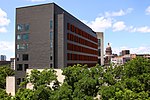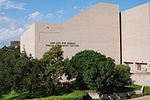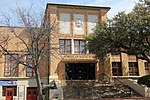Dell Seton Medical Center
2017 establishments in TexasHospitals established in 2017Hospitals in Austin, TexasLevel 1 trauma centers

Dell Seton Medical Center at The University of Texas is a hospital on the property of the Dell Medical School in Austin, Texas. It is the teaching hospital for the medical school.It is on land owned by the University of Texas at Austin. Central Health leases the land, and in turn the owner and operator of the hospital building, Seton Healthcare Family, subleases it from Central Health.
Excerpt from the Wikipedia article Dell Seton Medical Center (License: CC BY-SA 3.0, Authors, Images).Dell Seton Medical Center
Red River Street, Austin
Geographical coordinates (GPS) Address Phone number Website Nearby Places Show on map
Geographical coordinates (GPS)
| Latitude | Longitude |
|---|---|
| N 30.276586087164 ° | E -97.734027460864 ° |
Address
Ascension Dell Seton Medical Center at The University of Texas
Red River Street 1500
78701 Austin
Texas, United States
Open on Google Maps











